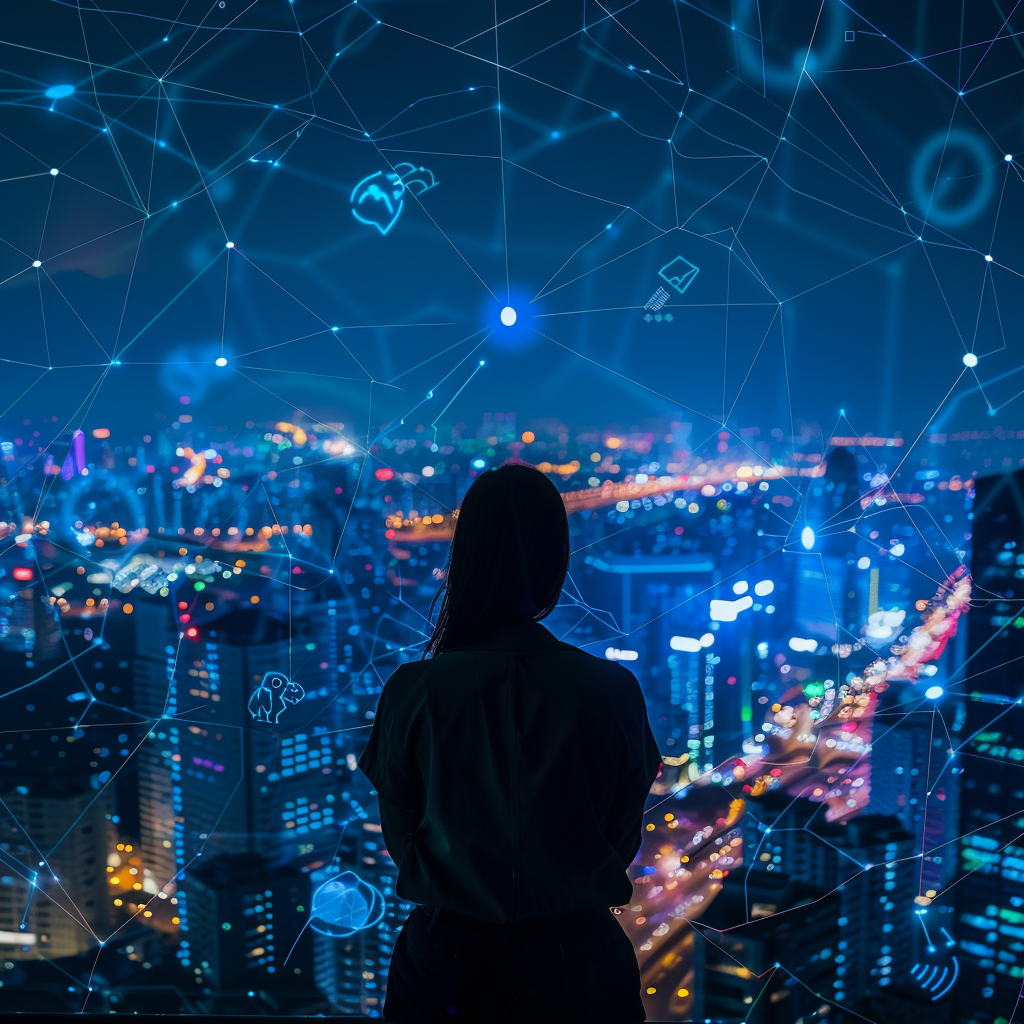What are the benefits and risks AI poses on Global Politics?
Artificial intelligence (AI) is advancing rapidly in society. It is imperative to critically examine its implications for global politics. By exploring AI’s impact, we can better understand its complexities. We can develop actionable strategies to harness its potential. At the same time, we mitigate its risks. One year ago I therefore studied 15 credits Global Politics of Artificial Intelligence – Transnationalism, Agency, and Governance, at Malmö Universitty . My aim was to dive deeper, beyond learning about AI technology and testing different new AI tools.
I wanted insights about the context in which AI operates in different situations and on different levels to inform myself in my service designer role. A year later, those subjects are even more relevant than a year ago. Putting the AI development into a bigger perspective, looking at it from different angles may support our decisions and goals.
Global governance & geopolitics
Without a doubt, AI can process and analyze vast troves of data. It identifies patterns, trends, and insights. These would be difficult or impossible for human analysts to achieve alone. This capability can lead to policies that are more informed. Strategies can then address issues ranging from security and conflict prevention to economic development and climate change mitigation.
AI also offers opportunities to increase efficiency across diplomatic efforts and governance processes. AI-powered language translation, for example, can facilitate communication and understanding across cultures. AI can automate routine tasks like document processing and data entry, freeing up human personnel for higher-level strategic work. In the realm of security, AI capabilities in areas like cyber threat detection. AI enhances image recognition for surveillance. It also uses predictive analytics to strengthen national defence and counter terrorism efforts. AI may also play a role in arms control verification by automating monitoring and analysis of weapons systems. AI offers potential benefits for governance, security, and efficiency.
However, it also brings complex challenges. These include bias, privacy, geopolitical tensions, and ethical or legal norms that must be carefully navigated. AI systems may reinforce human biases and societal inequalities if they are trained on datasets that reflect historical discrimination.
This could perpetuate injustices in areas like immigration policies, social services provision, and criminal justice. There are also concerns about AI eroding privacy and civil liberties through ubiquitous surveillance, profiling, and social scoring systems. Authoritarian regimes could use AI technologies to further repress dissent and crack down on minority groups. AI could be used to generate deepfakes to sow disinformation and undermine social trust. AI systems controlling critical infrastructure like power grids and transportation networks could be vulnerable to cyberattacks.
Geopolitically, the AI race between the US, China and other powers risks escalating tensions and conflicts as nations vie for technological superiority. There are fears of an ”AI arms race” that could make warfare even more destabilising, and AI raises ethical questions about human accountability and compliance with international laws.
Global production chains and political economy
Global production chains and the international political economy face implications. On the one hand, AI offers the potential to optimize supply chain operations, drive automation and productivity gains, and foster innovation and competitiveness. AI can analyze vast troves of data to streamline production processes, inventory management, and logistics across global supply chains.
Through predictive analytics and machine learning, AI systems can identify bottlenecks, minimise waste, and enhance the efficient flow of goods and services, leading to increased cost savings and operational efficiencies. Additionally, the integration of AI-powered automation in manufacturing and service industries can boost productivity and reduce labor costs. Intelligent robots and machines can perform repetitive tasks with higher precision and consistency, potentially increasing output and quality.
Moreover, AI can drive innovation by accelerating research and development processes, enabling new product designs, and fostering the creation of entirely new industries and business models. Companies and nations that effectively leverage AI could gain a competitive advantage in the global marketplace. As AI offers potential benefits in terms of efficiency, productivity, and innovation, it also poses risks related to job displacement, economic disruption, and geopolitical tensions. One of the primary concerns is the potential for job displacement and labor market disruptions, particularly in sectors such as manufacturing, transportation, and customer service. This could exacerbate income inequality and social unrest.
Furthermore, the development and deployment of AI technologies require substantial resources and access to vast amounts of data, which could lead to the concentration of power and wealth in the hands of a few large tech companies and nations This could further entrench existing economic disparities, challenge suistainability and create new forms of dependency and exploitation. Resources may be diverted away from addressing pressing global challenges as nations vie for technological supremacy. Geopolitical tensions and an ”AI arms race” among major powers like the United States, China, and Russia could also intensify, destabilising the international order and increasing the risk of conflicts.
Integrating AI into production processes could also disrupt existing global value chains, leading to shifts in comparative advantages and potentially exacerbating trade tensions and protectionism. Divergent regulatory approaches across countries could create barriers to trade and hinder the free flow of data, which is essential for AI development.
Ethics and democracy
AI’s impact on ethics, society, decision-making and democracy holds immense potential for driving positive societal change and enhancing governance processes. AI-powered systems are being leveraged in healthcare, education, urban planning, resource allocation and environmental conservation to provide valuable insights, personalized services and support more informed decision-making.
However, the proliferation of AI also raises significant ethical and democratic risks that must be proactively addressed. As mentioned, a pressing concern is the potential for AI systems to perpetuate and amplify existing societal biases, prejudices and discriminatory practices that could reinforce inequalities and undermine principles of fairness and justice.
Most importantly, increasing reliance on complex, autonomous AI systems in decision-making processes raises issues around accountability and transparency. As AI becomes an inscrutable ”black box”, it becomes challenging to attribute responsibility for harmful actions or unintended consequences. This lack of clear accountability could erode public trust in governance institutions and democratic principles. Authoritarian regimes or malicious actors could also leverage AI technologies for pervasive surveillance, social control, manipulation of public opinion and suppression of dissent, posing a threat to civil liberties and democratic freedoms.
As the technology requires substantial resources and data access that could concentrate power in a few dominant players, with risk of new forms of dependencies, marginalization and socioeconomic inequalities. The European Union’s proposed AI Act aims to establish a framework with requirements like transparency and human oversight. However, critics argue it may still be insufficient for AI’s complex challenges.
Conclusion
The transformative power of artificial intelligence in reshaping global politics is indisputable. While AI offers opportunities to enhance decision-making transparency, drive innovation and economy and increase efficiency, it also carries significant risks of perpetuating biases, eroding accountability, increasing inequalities and enabling authoritarian control if left unchecked.
A proactive, multistakeholder approach is essential. Ethical development and international cooperation must prioritize ethical human-centered AI development. These efforts should ensure clear accountability and the protection of democratic freedoms. This approach is vital to harness this transformative technology’s potential. It steers us towards a future where AI enhances decision-making. Additionally, it promotes transparency and accountability. Finally, it strengthens democratic values worldwide, benefiting humanity as a whole.
Author
Ellen Pettersson, researched and written April 2024 in collaboration with generative AI tools such as Perplexity, ChatGPT , Google Gemini during studies of Global Politics of Artificial Intelligence – Transnationalism, Agency, and Governance, Malmö University. In the assignment, we were to use AI tools to collaborate to produce and write our essay. I used the assignment to test and compare and evaluate generative AI tools, such as LLMs as ChatGPT, Gemeni and Perplexity. I later also tried out to transform the text into a discussion-pod, by NotebookLM, and shared the result on Soundcloud .
How I worked with the AI tools is another blog post for me to write.

